|
|
|
Sort Order |
|
|
|
Items / Page
|
|
|
|
|
|
|
| Srl | Item |
| 1 |
ID:
139247


|
|
|
|
|
| Summary/Abstract |
The settlers constitute a minority group whose goals are becoming increasingly unpopular among Israelis. As a result, the degree of legitimacy granted to them by the government gradually eroded over the years. However, their project still thrives. Their impressive success can be attributed to their focus on the bureaucracy. As early as the 1960s, the settlers engaged in a constant effort to identify actors in state and semi-state agencies that had common interests with them. At first they mobilized supporters from within those agencies. Later they made any effort to fill available positions with their own people. Today, the settlers' movement in Israel has fused itself with the relevant elements within the bureaucracy to a degree that many state agencies serve as extensions of the settler movement.
|
|
|
|
|
|
|
|
|
|
|
|
|
|
|
|
| 2 |
ID:
139244
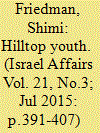

|
|
|
|
|
| Summary/Abstract |
In the first decade of this century, a new social group, popularly called the ‘hilltop youth’, came to the attention of Israeli society. This group consisted of a small number of young people who took part in aggressive political actions including illegal settlement endeavours throughout Judea and Samaria. Before their arrival at the various wilderness outposts, these youth had not developed any political outlook in regard to Jewish settlement in these areas; it was only during their period of habitation did they tend to adopt and utilize views informed by ideological and cultural extremism. The manifestation of this socio-political phenomenon will be analysed from sociological and anthropological perspectives in order to shed light on social aspects of Israeli society, as well as to elucidate frequently unclear political and policy implications in the larger Middle Eastern context. In addition, this article describes the significance of a youth subculture that has emerged in this frontier political space, and which has often been cast in criminological terms. To buttress the claims advanced in this study, a psychological-sociological approach is also employed.
|
|
|
|
|
|
|
|
|
|
|
|
|
|
|
|
| 3 |
ID:
139241
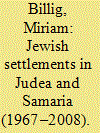

|
|
|
|
|
| Summary/Abstract |
This study describes the establishment and subsequent growth of settlements in Judea and Samaria, areas captured from Jordan during the Six Day War in 1967. In particular, the motivations and processes of these undertakings are examined from three different perspectives: time, place and society. A distinction is made between settlements that were initiated or tacitly approved by the government and those that were undertaken by private organizations or individuals, often flaunting a government freeze on building. The relative impact of ideology versus pragmatic considerations in shaping colonization in this region is also assessed. Quantitative data on demographic developments are integrated into the presentations of various communal morphologies that constitute the physical configurations and social fabric of the settlement enterprise.
|
|
|
|
|
|
|
|
|
|
|
|
|
|
|
|
| 4 |
ID:
139245
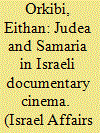

|
|
|
|
|
| Summary/Abstract |
This article argues that Israeli documentary cinema represents Judea and Samaria as an oriental space. An analysis of some prominent films reveals common conventions used by filmmakers in the cinematic representations of the region. These conventions establish a series of distinctions between ‘here’ and ‘there’, such as domestic versus foreigner, familiarity versus strangeness, safety versus danger, and belonging versus alienation. The orientalization of Judea and Samaria is considered here as a rhetorical strategy that enables filmmakers to perform a cultural construction of the region as a colonized landscape.
|
|
|
|
|
|
|
|
|
|
|
|
|
|
|
|
| 5 |
ID:
139246


|
|
|
|
|
| Summary/Abstract |
The dominant societal discourse of actors comprising Israel's security networks influences their choices for solutions to the perceived existential threat to the state from the demands and actions of the Palestinian authorities. Israeli elites, who are identified with the liberal discourse, propose to solve this problem by withdrawing, either unilaterally or via a peace process, from the Judea and Samaria region conquered in the 1967 war. This discourse requires the ‘securitization’ of the political process and the framing of Israeli control of Judea, Samaria and Gaza as an existential burden. By framing the security narrative in this way, the liberal elite seeks to draw support from most Israelis, who subscribe to an alternative ethno-national discourse, for abandoning the region.
|
|
|
|
|
|
|
|
|
|
|
|
|
|
|
|
| 6 |
ID:
139242
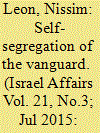

|
|
|
|
|
| Summary/Abstract |
The religious-Zionist settlement movement combines revolutionary national action with a conservative, religious way of life. On the one hand, the leaders of the religious-Zionist settlement movement see themselves as spearheading a national mission with pan-Jewish significance. On the other hand, living in the movement's communities entails a certain degree of segregation from general society. A religious-Zionist settlement is also a community-based tool for Orthodox self-defence against what is perceived by a fundamentally conservative society as different and threatening to its religious way of life and continuity. A selective religious enclave, such as the religious-Zionist settlement, which is not too distant from the centres of employment, commerce, services, and entertainment in central Israel, is also an efficient arrangement for moderating friction with secular society. In addition, Judea and Samaria provide environments for the development of a distinctive suburban lifestyle among the religious-Zionist core populations, enabling them to be part of the new Israeli middle class at a price that young couples and (usually large) religious families can afford.
|
|
|
|
|
|
|
|
|
|
|
|
|
|
|
|
| 7 |
ID:
139240
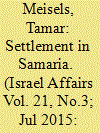

|
|
|
|
|
| Summary/Abstract |
This essay presents the interests of settlers and settler nations in a new and favourable light, with reference to the Jewish settlements in Samaria in particular. It sets out two lines of argument supporting the inclusion of the Jewish settlement blocs in Samaria into the State of Israel. It argues that taking existing national settlements into account as a major factor in marking boundaries has both distinctly liberal foundations (in John Locke's Second Treatise) and liberal-national appeal. The paper also considers historical reasons for supporting the Zionist settlement project from the start, and within Samaria in particular. Finally, it addresses the complicated and controversial issue of settlement in disputed territories. Ultimately I suggest that Israel has a particularly strong case for entitlement to the territories to which it lays claim, though these interests must compete with countervailing considerations and may not always prevail.
|
|
|
|
|
|
|
|
|
|
|
|
|
|
|
|
| 8 |
ID:
139243
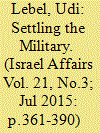

|
|
|
|
|
| Summary/Abstract |
The article describes the establishment of the pre-military academies in Judea and Samaria as cultural agents preceding the militaristic habitus of these areas. It follows the development of the security epistemic community in these areas which formed a new identity of the settlers. The increase of religious-Zionist youth in combat units and officer courses in the IDF due to these academies altered the positioning of the settlers and all religious Zionists in Israeli society vis-à-vis non-religious elites, the ultra-orthodox, and religious-Zionist groups who did not join the pre-military academy revolution. Judea and Samaria became a ‘security zone’ identified with sacrifice, heroism, giving, a pedagogical partnership with the army, reflected in higher percentages of activities in educational, religious, and cultural institutions encouraging meaningful army service.
|
|
|
|
|
|
|
|
|
|
|
|
|
|
|
|
| 9 |
ID:
139248
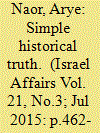

|
|
|
|
|
| Summary/Abstract |
Begin's ideology with regard to Judea, Samaria and Gaza was based on historical, theological and security related grounds, leading him to conclude that the Jewish people have an eternal, sacred right to the land. This was the basis for his settlement policy as prime minister and for the Palestinian autonomy proposal he made – both meant to prevent a division of the Land of Israel.
|
|
|
|
|
|
|
|
|
|
|
|
|
|
|
|
|
|
|
|
|